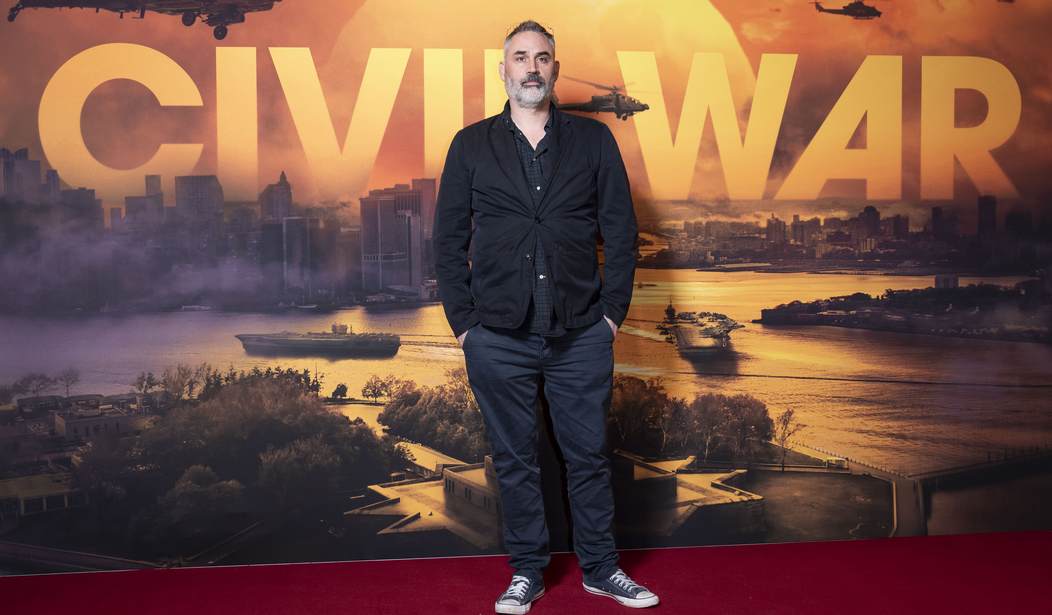I like a good disaster movie. A lot of the science fiction movies I loved as a kid (and still do) were really just disaster movies with aliens in them. Earth vs. the Flying Saucers has some fantastic scenes of Washington, DC being destroyed by the titular flying saucers.
This was essentially remade in the 90s as Independence Day which features a fantastic shot of a saucer blowing up the White House.
So I really don't mind seeing national monuments blown up in the service of a good story. This weekend a new disaster movie is opening. It's called Civil War and the premise of this one is that America has divided into several different partisan factions. A tyrannical president in Washington is on the verge of being destroyed by a coalition of western states primarily backed by California and Texas. Frankly, I find the idea of flying saucers destroying the White House more believable than the idea of California and Texas teaming up. Here's the map released for the promotion of the film.
Pledge your allegiance. #CivilWarMovie pic.twitter.com/XRYuLoGBYR
— A24 (@A24) April 2, 2024
Several reviewers have pointed out that the story of Civil War is set in the modern day but seems to avoid connecting itself to any real political issues that are big at the moment.
The film is set in what appears to be the present, but in this version of the present a combination of strongman tactics and secessionist movements have fractured the United States into multiple armed, politically unspecified factions. The president (Nick Offerman), we’re told, has refused to give up power and is now serving his third term; he’s dissolved the FBI, bombed American cities, and made a point of killing journalists on sight, or so we’re told. California and Texas have joined forces and become something called the Western Front. There’s also the so-called Florida Alliance. Smoke rises from the cities; the highways are filled with walls of wrecked cars; suicide bombers dive into crowds lined up for water rations; death squads, snipers, and mass graves dot the countryside.
How we got here, or what these people are fighting over, is mostly meaningless to Kirsten Dunst’s Lee and Wagner Moura’s Joel, two war journalists making the treacherous drive from New York City to Washington, D.C., for an exclusive, probably dangerous interview with the beleaguered president...
Civil War’s lack of a political point of view, as well as its refusal to really identify the positions of its warring parties, has come in for some understandable criticism. But does any sane person really want a version of this film that attempts to spell out these people’s politics or, even worse, takes sides in its fictional conflict?
A reviewer at the Blaze seems to agree that, while it's obvious the president in the film is meant to be Trump, the film would have been a disaster if it tried to delve deeply into what was motivating the various factions.
It's all very effectively done: harrowing urban combat, menacing rednecks with "assault rifles," real-life Dunst-hubby Jesse Plemon in those red sharpshooter shades. If the point is "war is hell," consider it made. Although, there's nothing here Steven Spielberg didn't do better 25 years ago in "Saving Private Ryan."
And that better be the point, as the movie has nothing to say about our current political divisions. Take away the burned-out shopping malls and the assault on the Lincoln Memorial, and the "Civil War" might as well take place in Bagdad or Odessa.
Had Garland spent his $50 million budget on making the kind of libtard, death-to-muh-democracy fever dream that's been stupefying half of the country since 2016, he would've had a "Battlefield Earth"-level camp classic on his hands.
But over at the NY Times, Michelle Goldberg is pretty excited that the politics of the film are more recognizable than she expected.
“Civil War” has received plenty of adulatory reviews, but Garland has also been widely criticized for eliding the ideological forces driving America’s fracturing...
Garland’s No Labels-style denunciation of extremism in general — as opposed to the particular kind of extremism behind America’s most deadly recent political violence — seemed to me a little glib and cynical, as if he wanted to make a hugely provocative movie but not risk offending potential audiences. If you’re going to dramatize many of our worst fears about the trajectory of American politics, I thought you should take the substance of those politics seriously...
But now that I’ve seen “Civil War,” which is neither glib nor cynical, Garland’s decision to keep the film’s politics a little ambiguous seems like a source of its power. The emphasis here should be on “a little” because, contrary to some of what I’d read, its values aren’t inscrutable, just lightly worn. Yes, there is a reference, early on, to “Portland Maoists.” We learn that the film’s heroine, a valiant, traumatized combat photographer named Lee, is famous for shooting the “antifa massacre,” but we never find out if antifa members were the perpetrators or victims. Still, it’s not a stretch to interpret the film as a premonition of how a seething, entropic country could collapse under the weight of Donald Trump’s return.
So I'm going to skip this one in theaters. Frankly, I suspect that despite the decision to gloss over the politics driving the story, the actual politics driving the creation of this film aren't that hard to discern. Democrats are running on one primary message this year: The threat to democracy posed by Donald Trump. And here we are with a new film that envisions an America where democracy has collapsed and turned the entire country into a dystopian hellscape. Does anyone doubt these two things are connected?
None of that means it couldn't be an entertaining movie. It still could be but I'll wait until it shows up on Netflix. No doubt that will still be sometime before the election.








Join the conversation as a VIP Member